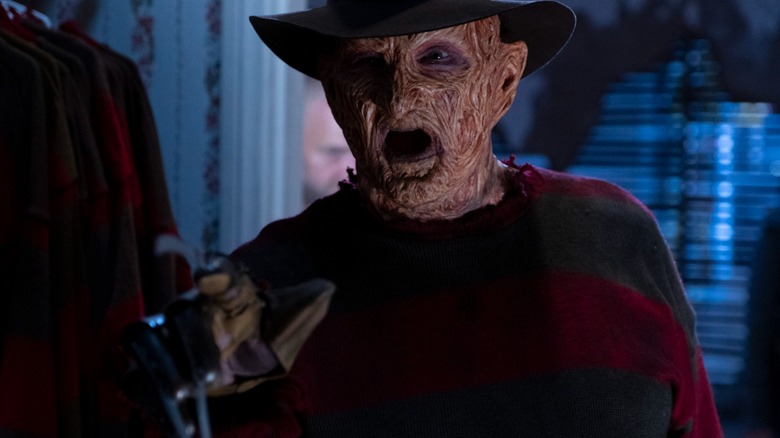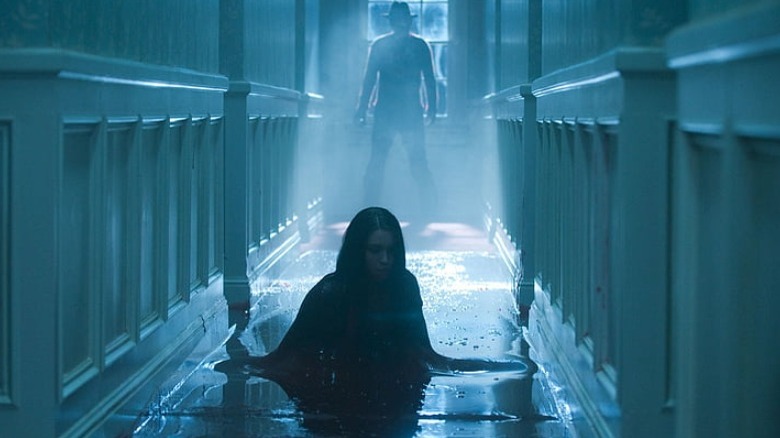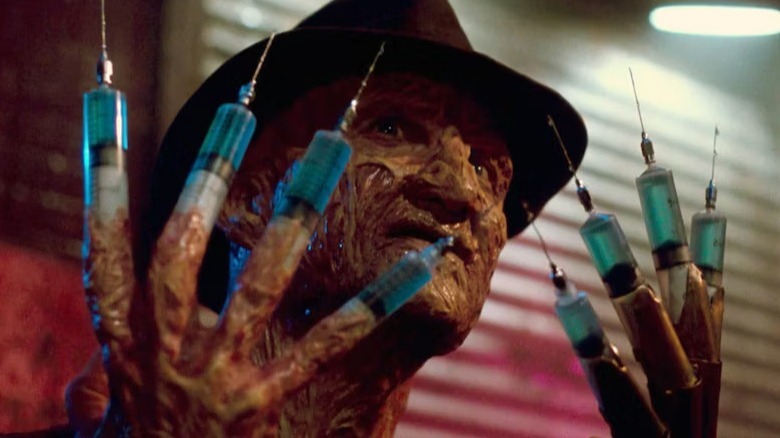Robert Englund Sees A Problem With Potential Nightmare On Elm Street Remakes
The "A Nightmare on Elm Street" franchise has nine entries so far, and Robert Englund's portrayal of Freddy Krueger in the first eight films has been nothing short of iconic. 2010's "A Nightmare on Elm Street," a remake of Wes Craven's 1984 film of the same name, had Jackie Earle Haley don Krueger's signature leather glove. While Englund did not reprise his role as Freddy in said remake and was last seen in "Freddy vs. Jason" (the eighth entry in the franchise), the horror actor voiced his support for the remake when it was released. Despite performing well at the box office, it was criticized by longtime fans, as the narrative lacked depth and the characters failed to capture the essence of Craven's original stories.
Currently, the U.S. rights to the "A Nightmare on Elm Street" franchise and Freddy Krueger have been reverted to the Wes Craven estate, which is in the process of taking pitches to further expand the franchise. Although no official announcements about a potential new projects have been made yet, likely, we will soon have a 10th entry that looks at expanding Krueger's lore from a fresh perspective.
In a 2020 interview with TooFab, Englund revealed that while he will not be reprising his role as Freddy again, he is open to a cameo role in future franchise entries. Englund also talked at length about the potential issues inherent within remakes of popular '80s horror franchises while citing 2010's "Nightmare" as an example, explaining his perspective on what needs to be changed to keep the franchise alive.
Most remakes are rushed and premature
In the TooFab interview linked above, Robert Englund explained that the problem with most remakes, including 2010's "A Nightmare on Elm Street," is most of them are made without considering how these kinds of stories are deeply ingrained in popular culture. For instance, Netflix's "Texas Chainsaw Massacre" completely ignored what made Tobe Hooper's 1974 original a horror classic and chose the clichéd slasher route without investing in it with depth or meaning. As current audiences have already seen similar (and better) horror stories play out, any attempt to reinvigorate a well-loved franchise fails if this aspect is not kept in mind. In the context of "A Nightmare on Elm Street," Englund explains the sentiment as follows:
"I know the remake of 'A Nightmare on Elm Street' was premature. We should have done another 'Freddy vs. Jason' film and then waited, they should have waited for five or 10 years. I think it's the same thing with 'Child's Play' ... I think they're so part of the culture and they're being rerun so much and they're available on DVD."
Englund followed this up by saying the target audience for such films, i.e. younger audiences, can simply pop in classic franchise entries on Blu-ray and watch them in full HD glory. These experiences are transformative and visceral, which makes shoddy and rushed attempts at remakes fall short in comparison. The key, I'm guessing, is to make a film that retains the essence of the original while recontextualizing the narrative from a postmodern lens, such as the latest entry in the "Scream" franchise — the film is both a love letter to Craven and horror fans, and it introduces new characters worth rooting for.
The recipe for an effective remake
Robert Englund posited that the "secret" to the success of the "Nightmare on Elm Street" films lies in a specific environment to the young characters, which cannot be replicated anymore, as current remakes must incorporate evolved sensibilities and take a more diversified approach:
"The secret of 'Nightmare on Elm Street' is loss of innocence and the kids need to be like, Midwestern kids, they can't be hip, chic, junkie kids. They have to be middle-American kids that think they're a little hip and they are co-opted by evil and they lose their innocence on all levels: sexual, violence, murder, death, the realization of their parents' flaws, all of those things."
The horror actor explained his stance further by taking the example of "A Nightmare on Elm Street 2: Freddy's Revenge." If the film were to be remade, the portrayal of Jesse (played by Mark Patton) needs to shed the original film's mishandling of the homoerotic subtext and embrace a more nuanced, inclusive take on the character's sexuality. This also reframes Freddy's intentions in terms of psychologically toying with the character, and Englund insists a remake would need to make him "a different kind of evil." This is similar to how Pennywise's evil is heightened in "It Chapter Two" where the killer clown's actions are fueled by homophobia and bigotry.
In essence, Englund wants future "A Nightmare on Elm Street" remakes to work with established sociocultural contexts and push them further while keeping current societal scenarios in mind. This, of course, has to be done tastefully without resorting to cheap shock factors. Horror has always been a conduit for meaningful social commentary, and remakes need to keep this aspect in mind and widen the ambit of the genre in interesting ways.


